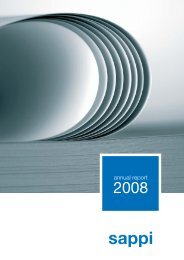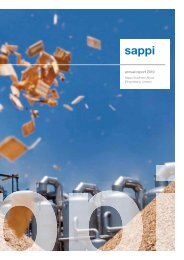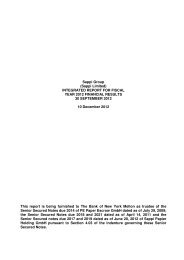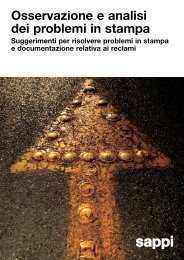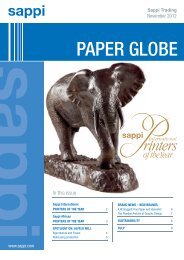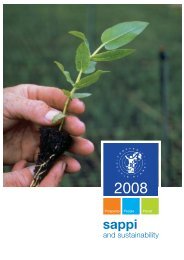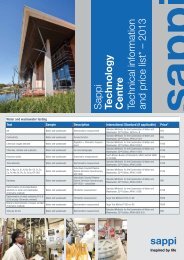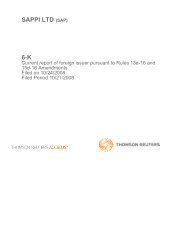2007 Annual Report - Sappi
2007 Annual Report - Sappi
2007 Annual Report - Sappi
You also want an ePaper? Increase the reach of your titles
YUMPU automatically turns print PDFs into web optimized ePapers that Google loves.
36. New United States accounting standards<br />
In June 2006, the FASB issued Interpretation No. 48 (“FIN No. 48”), Accounting for Uncertainty in Income Taxes – an<br />
interpretation of FASB Statement No. 109, which clarifies the accounting for uncertainty in income taxes recognised in an<br />
enterprise’s financial statements in accordance with SFAS No. 109, Accounting for Income Taxes. The Interpretation provides<br />
a recognition threshold and measurement attribute for the financial statement recognition and measurement of a tax position<br />
taken or expected to be taken in a tax return. Under FIN No. 48, the company may recognise the tax benefit from an uncertain<br />
tax position only if it is more likely than not that the tax position will be sustained on examination by the taxing authorities,<br />
based on the technical merits of the position. The tax benefits recognised in the financial statements from such a position<br />
should be measured based on the largest benefit that has a greater than 50% likelihood of being realised upon ultimate<br />
settlement. FIN No. 48 also provides guidance on derecognition, classification, interest and penalties, accounting in interim<br />
periods, disclosure, and transition. FIN No. 48 is effective for us beginning 1 October <strong>2007</strong>. We are currently evaluating the<br />
provisions of FIN 48 and have not yet completed our determination of the impact of adoption on our financial position or results<br />
of operations.<br />
In September 2006, the FASB issued SFAS No. 157, Fair Value Measurements, which defines fair value, establishes a<br />
framework for measuring fair value in generally accepted accounting principles, and expands disclosures about fair value<br />
measurements. SFAS No. 157 does not require any new fair value measurements, but provides guidance on how to measure<br />
fair value by providing a fair value hierarchy used to classify the source of the information. This statement is effective for us<br />
beginning October 2008. We currently are assessing the potential impact that adoption of SFAS No. 157 would have on our<br />
financial statements.<br />
In February <strong>2007</strong>, the FASB issued SFAS No. 159, The Fair Value Option for Financial Assets and Financial Liabilities. SFAS<br />
No. 159 gives us the irrevocable option to carry many financial assets and liabilities at fair values, with changes in fair value<br />
recognised in earnings. SFAS No. 159 is effective for us beginning October 2008, although early adoption is permitted. We<br />
are currently assessing the potential impact that adoption of SFAS No. 159 will have on our financial statements.<br />
On 15 November <strong>2007</strong>, the Securities and Exchange Comission (SEC) approved rule amendments under which financial<br />
statements from foreign private issuers in the United States of America (USA) will be accepted without reconciliation to US<br />
Generally Accepted Accounting Principles if they are prepared using International Financial <strong>Report</strong>ing Standards (IFRS) as<br />
issued by the International Accounting Standards Board. The rule amendments will be applicable to <strong>Sappi</strong>’s 2008 financial<br />
year as they apply to years ended after 15 November <strong>2007</strong>.<br />
sappi limited | 07 | annual report 169



